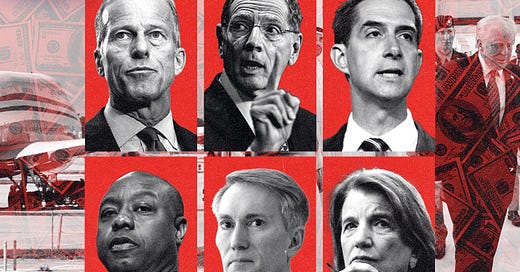The World’s Most Vacuous Body
By rejecting its vital oversight role, the U.S. Senate is abdicating its constitutional duty during the second Trump era.
Since the passage of the 1933 Securities and Exchange Act, the responsibilities — and liabilities — of corporate board of directors have steadily increased. The 1933 Act was the first to establish that directors were liable for misleading statements in offering documents. This was an effort to re-establish public trust in the stock market after the 1929 crash that kicked off the Great Depression.
In practice, the initial efforts were mostly symbolic until the 1942 SEC Rule 14a-9 became law, making individual directors personally liable for being aware that a company was providing false information to the public. Since then, a series of SEC regulations has increased the scope of director responsibility.
In 2001, after the collapse of Texas energy corporation Enron, the directors paid $13 million to settle shareholder lawsuits. This was the first time directors were personally fined without the backup of insurance or corporate identification.
WorldCom directors paid $18 million a year later as part of a $55 million class settlement. Their liability was established because they knew of WorldCom's fraudulent accounting practices and did nothing.
One of the great failures of the post-2008 financial collapse was the few directors who were penalized. In a variation of “too big to fail,” the scale of the directors’ potential liability helped protect the directors from being individually responsible financially or criminally charged. That led to the 2010 Dodd-Frank Act and other FEC regulation. For the first time, boards are required to attempt to recover incentive-based compensation from executives if it’s found that those payments were made on false numbers.
The pattern is clear. Since the Great Depression, a growing body of law and regulation has placed greater responsibility and personal liability on board directors. So, what does this have to do with the politics of the moment?
United States senators take an oath of office required by the Constitution:
“I do solemnly swear (or affirm) that I will support and defend the Constitution of the United States against all enemies, foreign and domestic; that I will bear true faith and allegiance to the same; that I take this obligation freely, without any mental reservation or purpose of evasion; and that I will well and faithfully discharge the duties of the office on which I am about to enter. So help me God.”
In practice, the U.S. Senate serves as a Board of Directors of American democracy. By swearing to uphold the Constitution, they are swearing to enforce the Emoluments Clause of Article I, Section 9, Clause 8:
"No Title of Nobility shall be granted by the United States: And no Person holding any Office of Profit or Trust under them, shall, without the Consent of the Congress, accept of any present, Emolument, Office, or Title, of any kind whatever, from any King, Prince, or foreign State."
It is impossible for even the most delusional and sycophantic senator not to grasp that Donald Trump is violating this constitutional duty. In the latest example of accepting a plane from Qatar, Trump is taking hundreds of millions in value from a king, a prince, and a foreign state. He managed to hit a trifecta of corruption.
I have helped elect many Republican U.S. senators and have known dozens over the years. They were all different, but one thing they had in common was their personal conviction that they were not corrupt. To some degree, this falls into the same category as the old saying that if you ask convicted felons, you’ll quickly learn there are no guilty men and women in prison. For some, no doubt, refusing to consider themselves corrupt is a self-serving lie they tell themselves, but in my experience, most actually believe they are honest.
Now we are in the Trump era, a phrase I loathe to write, but it is what it is. Every one of these Republican senators who do not speak out against the historic crime spree of the mob family that is led by Donald Trump should be considered corrupt. Just as the legal definition of personal responsibility for board directors now establishes that the knowledge of improper actions, false statements, and illegal self-dealing is sufficient to charge the director with potential criminal charges, so it is with these Republicans.
I’m talking about you, John Thune, John Barasso, Tom Cotton, Shelly Moore Capito (her dad was indicted when West Virginia governor for extortion, so she should have some frame of reference), James Lankford and Tim Scott. That’s the Republican Senate leadership, but the Senators who voted them into their positions are all corrupt when they ignore Trump’s corruption. Theirs is the lasting shame of knowing and doing nothing.
I wrote a book called It Was All A Lie that focused on the moral collapse of the Republican Party. That was in 2020, but I still find it shocking the willingness to degrade a personal sense of decency and honesty to match Trump’s level. My Lincoln Project pal Rick Wilson called it, in a brilliant and prescient 2018 book, Everything Trump Touches Dies.
Their excuse for silence will fall into the same category of, “I was just following orders.” That sad reach for some rationalization to justify doing what you know is wrong never works. But let them tell whatever lies they need to get through their day. We know differently — and so does history.






You loathe to write. I loathe to live in it.
Republicans have never met a money opportunity for themselves (and their owners) that they cannot resist and to hell with the rest of America.